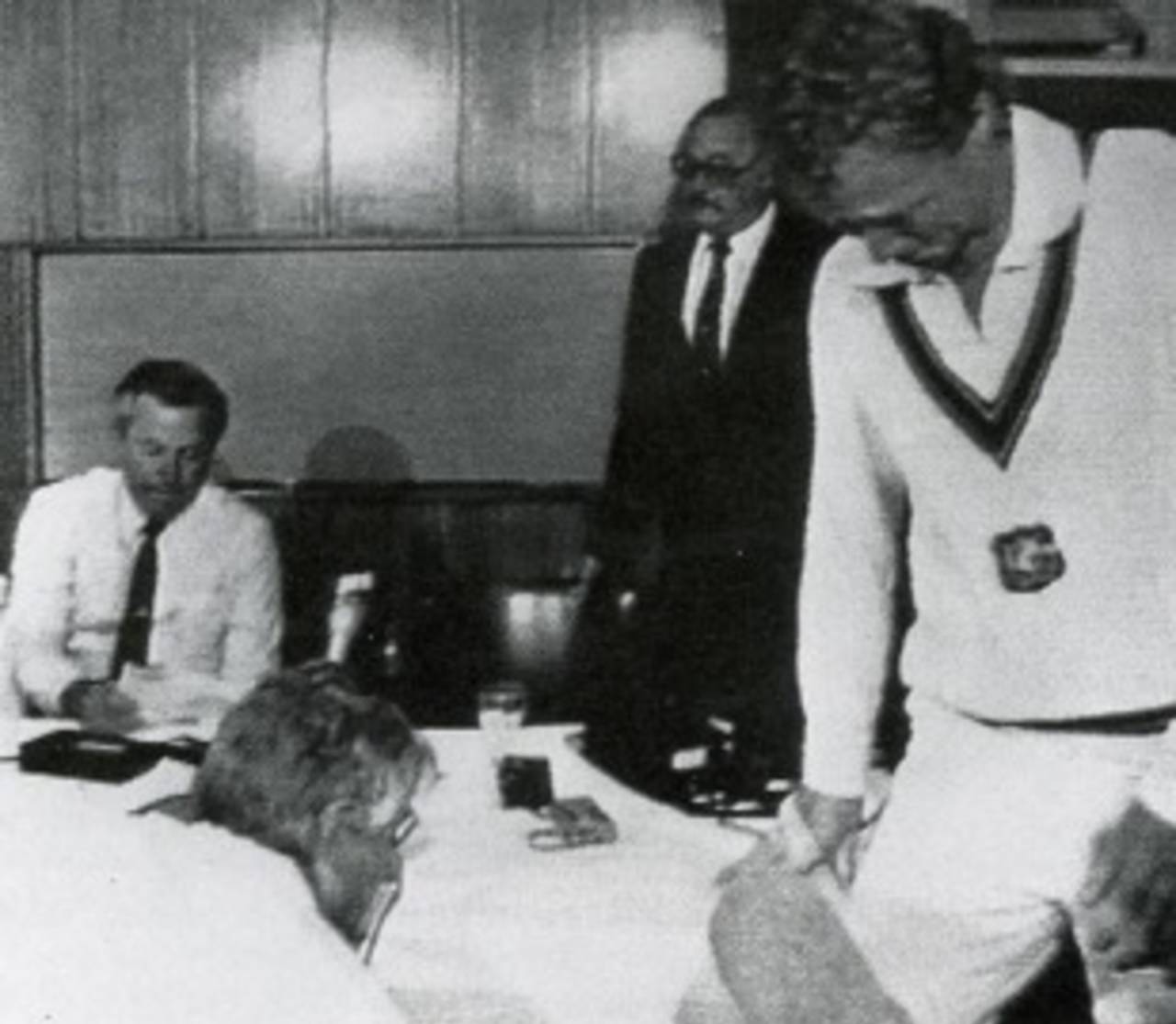Spare a tear for the underdog
Often the cricket fan's sympathy lies with the vanquished, not the victor
Tanya Aldred
13-Jun-2010

Kim Hughes leaves the press conference after announcing his resignation as captain at the end of the series loss to West Indies in 1984 • ESPNcricinfo Ltd
What if your overwhelming feeling on watching England's clinical victory at Old Trafford was pity? If you were wringing your hands for the sharp-boned, smooth-chinned and whippet-waisted Bangladeshis instead of whopping it up triumphantly for Andrew Strauss and his muscular, ball-swinging Englishmen?
Is it unpatriotic? Patronising? Pathetic? Post-colonial? Or just human. Do cricketers share the same feelings? Do Australians? Would they admit it if they did?
Poor Bangladesh. They were slated for their bowling, their lack of tactical nous and their inexperience. The brilliant Tamim Iqbal aside, their batting didn't power up the national grid. They were playing to sometimes semi-full grounds, and against some fine English bowlers in near-perfect conditions. Some commentators could barely contain their disdain. Yet Bangladesh still had the English worried, at times; which is more than England at their nadir did to West Indies or Australia. They are young, they have spirit, but they lose. It must be painful.
But Bangladesh don't hold a unique place in cricket history. There are countless times when the onlooker's sympathy falls not with the triumphant, sometimes braying, winner, but the team, or the man, with his head bowed.
Travel back 11 years. To June 17 1999, to Edgbaston, to the World Cup semi-final, to Allan Donald. Remember that woeful half-run, the grounded, dropped bat, the despair, the pads suddenly lead weights. And his face, like a man standing at the edge of the world and realising there is nowhere left to go. And all the while the Australians whirling, jubilant, at their sudden against-the-odds passage to Lord's.
Then remember David Gower. On many occasions. Like when he declared against West Indies in the second Test at Lord's in 1984 on the morning of the final day, only for Gordon Greenidge (214 not out) to ease West Indies to the 342 runs needed to win in 66.1 overs. Or when he dreamily flicked at the last ball before lunch during the fourth Test in Adelaide in 1991, and was caught by Merv Hughes at deep square-leg, where he had been placed with less-than-subtle arm-waving. Gower's captain, Graham Gooch, was at the other end and refused to speak to Gower as they left the field. (Of course Gower does still divide opinion - where some felt sympathy, equal numbers felt morally exploding fury.)
Next, think of Sri Lanka and the last World Cup in the West Indies. And that interminable final. The panache with which Sri Lanka had played the previous games and the revelation of Lasith Malinga came up against what Allan Border called the Australian "pack of wolves", the rain, the dark and some inept umpiring. The game ended with victory for the Australians but with a whimper. Perhaps even more than for Sri Lanka, you felt sympathy for the West Indians, people for whom the promised carnival of cricket had been soured.
Off the field, Kim Hughes' lonely tear-stained press conference in the tea room at the Gabba on November 26, 1984 stands alone. All those snubs and humiliations poured upon him from the sidelines and the broken dreams can be seen in that crumpled face. Here is abject defeat and humiliation. I defy anyone to have felt any triumph.
And finally, when the chips are down, remember New Zealand, every time they play, and get beaten by, Australia. They have won only seven of the 50 matches between the two sides; their last victory was 17 years ago and counting.
What a treat to be aimlessly sorting out the piles of washing while listening to Radio Four on Tuesday afternoon and to suddenly hear the velvety voice of Christopher Martin-Jenkins in the Afternoon Play. Last days of Grace, by Nick Warburton, is set at a snow-dusted Oval during Easter 1908 and you hear CMJ as the Voice of Cricket intoning the names of the Gentlemen of England: CB Fry, WG Grace, FS Jackson… I think his life's work is now complete.
Tanya Aldred lives in Manchester. She writes occasionally for the Guardian